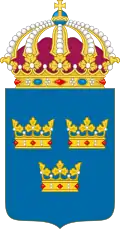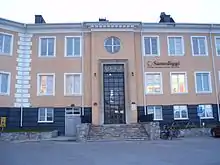Sámi Parliament of Sweden
The Sámi Parliament of Sweden (Swedish: Sametinget, Northern Sami: Sámediggi) is the representative body for people of Sámi heritage in Sweden. It acts as an institution of cultural autonomy for the indigenous Sámi people.
 |
|---|
| This article is part of a series on the politics and government of Sweden |
|
|
Sámi Parliament in Sweden | |
|---|---|
 | |
| Type | |
| Type | |
| History | |
| Founded | 1 January 1993 |
| Preceded by | Swedish Sámi Council |
| Leadership | |
Speaker | Paulus Kuoljok, Samelandspartiet/Sámiid Riikabellodat since 2017 |
President of the Sámi Parliament | Paulus Kuoljok, Samelandspartiet/Sámiid Riikabellodat since 2017 |
| Structure | |
| Seats | 31[1] |
_S%C3%A1mediggi_2017.svg.png.webp) | |
Political groups |
|
| Elections | |
Last election | 2017 |
Next election | 2021 |
| Meeting place | |
 | |
| Sámi Parliament of Sweden Building Kiruna, Sweden | |
| Website | |
| www | |
History
The Sami Parliament Act, Sametingslag (1992:1433), established the Swedish Sami Parliament as of 1 January 1993. By law, the first official elections were held on 16 May 1993. Its first session was opened by the King of Sweden, Carl XVI Gustaf, on 26 August 1993 in Kiruna. It has 31 representatives, who are elected every four years by general vote. The current chairperson of the Sámi Parliament is Paulus Kuoljak, since 2017. The chairperson is formally assigned by the Swedish Government upon the proposal of the Sami Parliament.
Responsibilities
Sweden has taken this active part for two reasons:
- to recognise the Sámi minority as an indigenous people to distinguish it from other minorities;
- to raise the Sámi minority influence which comes into conflict with the European majority democracy system, i.e., the group with the most votes wins.
Voting system
Sámi Parliament is democratically elected and acts as an autonomous authority. Sámi inhabitants have a vote, in addition to the regular elections in Sweden, to elect representatives to the Sámi Parliament if:
- they identify as culturally or ethnically Sámi, and either
- they speak a Sámi language, or
- they have had or have a parent, or grandparent, that speaks or spoke a Sámi language
See also
References
- "Valresultatet 2017". sametinget.se. Sàmi Parlament. Archived from the original on 20 October 2020. Retrieved 20 October 2020.